How We Increased Clicks by 630%
By Liz Willits April 18, 2018
You’ve probably read about email segmentation. In fact, pro email marketers recommend it all the time.
But is it really worth the work? After all, segmentation takes effort. It’s much easier to simply send a generic email to your entire list.
To find out, we decided to put segmentation to the test.
We updated our blog’s email automation series. The goal? To ask each subscriber what content they wanted in their inbox, and email them segmented content based off their choice.
We got some crazy results — like an email click-through rate 630% above our average.
Here’s how we did it …
How we redesigned our blog welcome series to collect subscribers’ preferences
When people subscribe to our blog newsletter, they receive a weekly email with our latest and best blog content. We also send them an automation series right after they subscribe.
This series is our way of welcoming subscribers to our email list. We explain how often we’ll send them emails and what kind of content they’ll get. Then, we email them our best content — like our top blog posts and our best free courses.
But something was missing from the series …
We didn’t know what topics our audience was most interested in learning about, and we had no way of segmenting our audience based off their individual learning interests.
This info was important for two reasons:
- Knowing what topics the majority of our audience wanted to read would help us write the right content for our audience. If most people were interested in automation, for instance, then we should be writing more posts about automation!
- Knowing more about each individual subscriber would help us send more relevant content. Instead of sending every subscriber the same blog post, we could send blog posts to groups of subscribers based on their interests.
That’s why we redesigned our blog series. In the new series, we asked subscribers what content they wanted to receive. All they needed to do was click a link to tell us what topic they were most interested in.
There are 6 email marketing topics our audience typically asks questions about. We made these 6 topics the options a subscriber could click. They could learn how to:
- grow their email list.
- automate their email marketing.
- create and send emails.
- design emails.
- make money with email marketing.
- improve their open and click-through rates.
Or, they could choose to learn about everything!
To gather our subscribers preferences, we added this simple email to our blog welcome series:
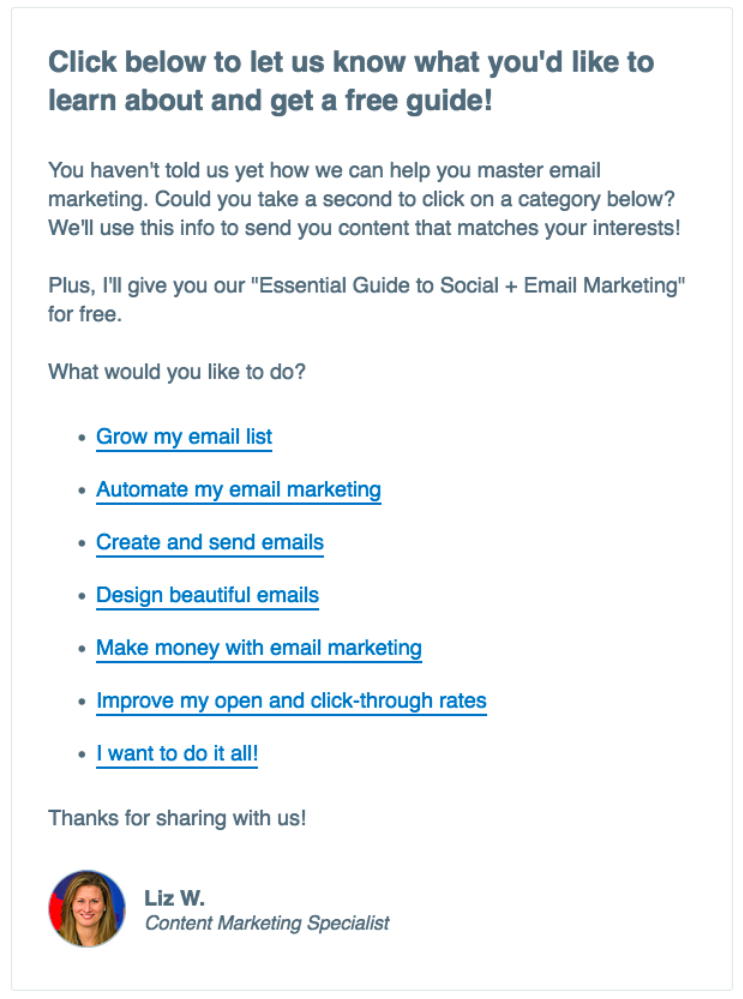
When a subscriber clicks on one of the links, they get access to a landing page where they can download the free “Essential Guide to Social + Email Marketing.” (That’s our incentive for having them participate in answering the question.) On that page, we also share some of our most popular blog posts in their chosen category.
But behind the scenes, even more is going on! Using AWeber’s Click Automations, we automatically tag subscribers with a label that matches their choice when they click on one of the options. For example, if a subscriber clicks “Grow my email list,” they receive a “grow email list” tag.
Using AWeber and tags, we can build segments of subscribers who have a particular tag, and then send one-time emails or automation series to that segment. This gives us the ability to do some pretty powerful things.
Let’s say we wanted to share our latest post on increasing email open rates. Instead of sending the same email to our entire list, we could send that post specifically to people who told us they wanted to improve their open and click-through rates. By segmenting our audience in this way, we hypothesized that we’d get better open and click-through rates.
But there was one flaw with our method. Not everyone opens an email. Even fewer people click on it. Our new email would only collect the preferences of subscribers who chose to engage with it. This meant that we wouldn’t be able to collect the interests of everybody on our list.
That’s why we added a second, similar email at the end of our welcome series:
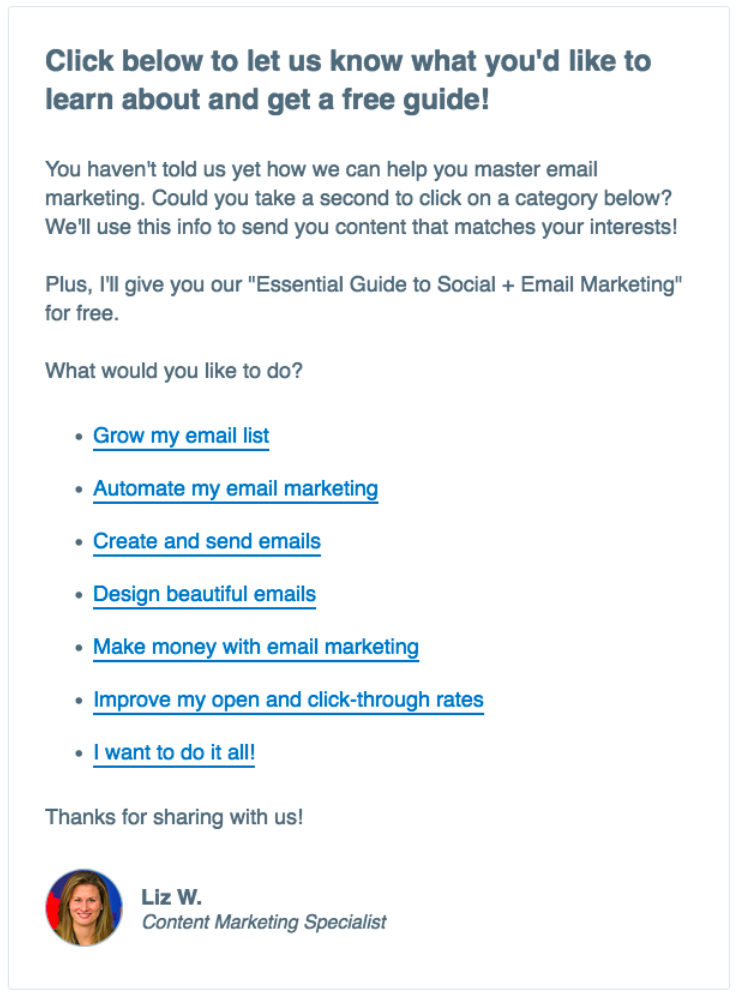
This email gave subscribers who didn’t click on the first email another chance to share their preferences. By adding it to our series, we were able to encourage even more people to tell us what topics they’d like to learn more about. And the best part? Using segmentation and automation, we only sent this email to people who didn’t open or click the first email asking for their preferences.
Here’s how we structured the updated series:
Email 1: Welcome to the AWeber blog newsletter!
- Goal: Welcome subscribers to our list, tell them how frequently we’d send emails, deliver our incentive, and ask them to whitelist us.
- Delivery time: Immediately after subscribing
- Audience: All subscribers
Email 2: Share your interests and we’ll send a free guide
- Goal: Encourage subscribers to share what they’d like to learn about email marketing by clicking on a link in the email
- Delivery time: 1 day after email 1
- Audience: All subscribers
Email 3: Explore the best email marketing content
- Goal: Share our best blog content with our audience and get them excited about being a subscriber
- Delivery time: 1 day after email 2
- Audience: all subscribers
Email 4: Get 45+ email copy templates and master your content
- Goal: Delight our subscribers with even more educational and free content –– our “What to Write in Your Emails” course.
- Delivery time: 1 day after email 3
- Audience: All subscribers
Email 5: Would you like another free guide?
- Goal: To encourage more subscribers to click on a category and tell us what they’re interested in.
- Delivery time: One day after email 4
- Audience: Subscribers who didn’t click on a category in email 2
To get a visual picture, here’s an automation map of the updated series:
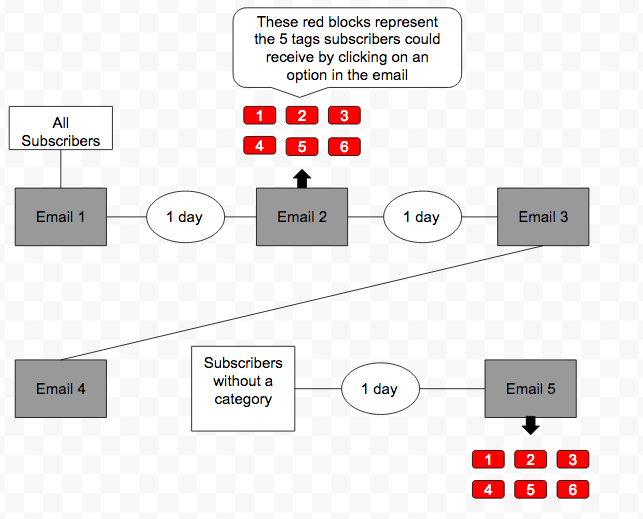
In the updated series, there are 7 content categories subscribers can choose from. However, we only use 6 tags in our series. That’s because the final option is to “Learn it all!” If a subscriber clicks this, they are tagged with all 6 tags, rather than a 7th separate tag.
Compare that to the automation map of the original series, which only had 4 basic, sequential emails:
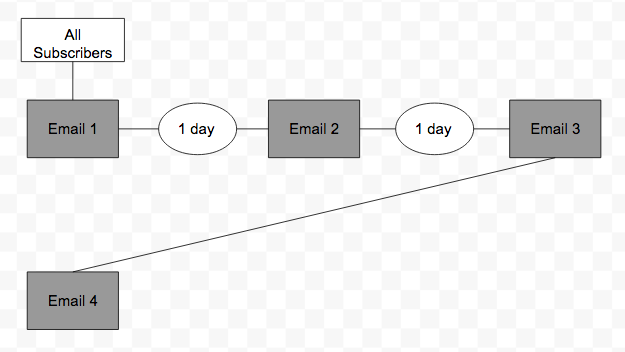
Pro tip: Instead of sending people to a landing page when they click on a Click Automation, you can send them to a hosted form that says something like “Thanks for sharing your preferences! We’ve updated your info.” This can be easier than creating a landing page.
But we still had a problem … what about our current subscribers?!
When we updated our welcome automation series to include these 2 new emails, we already had thousands of subscribers on our blog newsletter list. And since this series was only for new subscribers, current subscribers didn’t receive it. Which meant that we wouldn’t find out the interests of our current subscribers through this series.
So we decided to send all of our current subscribers a one-time broadcast email to ask them the same question.
This email functioned in the same way as the 2 emails we added to our automation series. When a subscriber clicked on one of the options, they received a tag that matched their choice. The email content is nearly identical to the ones we added to our automation series:
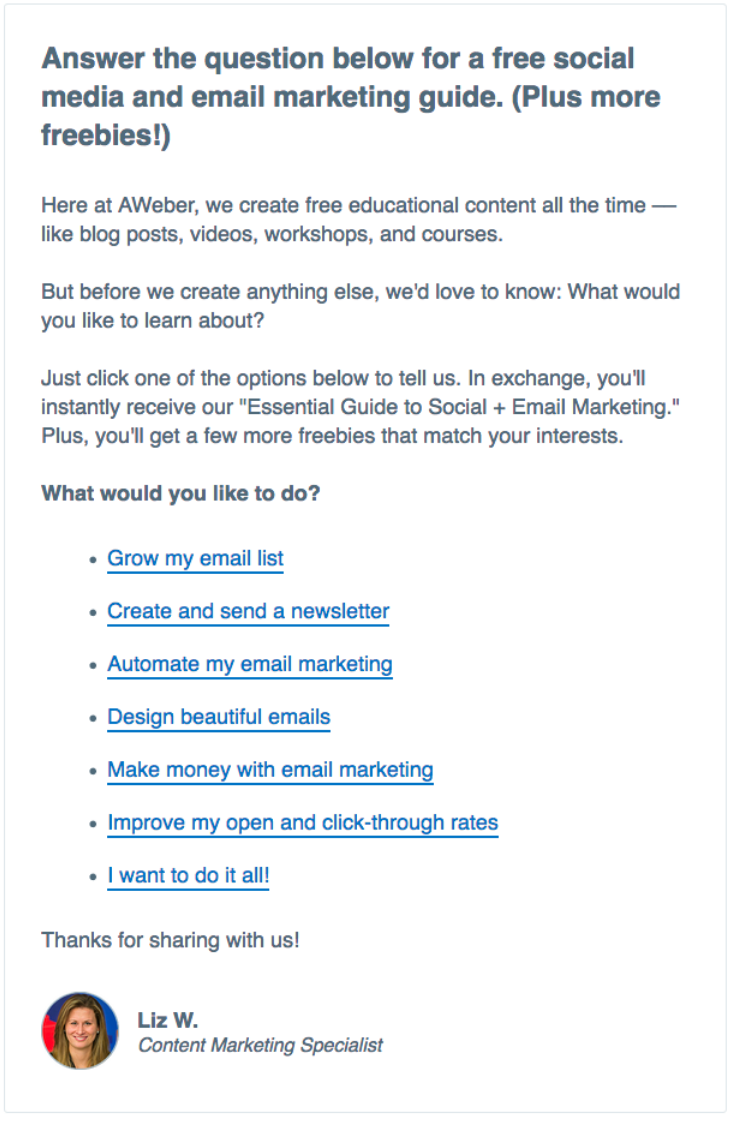
After sending it, thousands of our current subscribers clicked on an option to tell us what they’d like to learn about.
40% of them clicked “I want to do it all!” The second most popular choice was “Grow my email list,” with 21% of people clicking this option.
We chose the most popular category and gave subscribers a cool freebie.
Since the majority of our subscribers said they wanted to learn about list growth, we decided to email them our free course “Email List Growth Blueprint.”
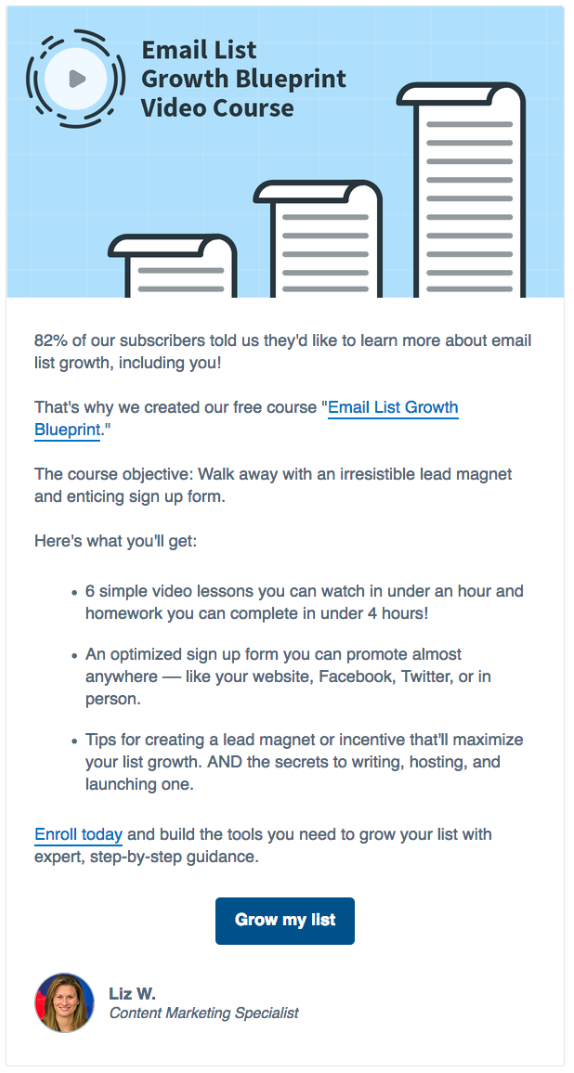
And we saw phenomenal results. Our open rate for this email was 118% higher than our average open rate for this list. Our click-through rate was an astounding 630% higher than our average click-through rate. 😱
This record-breaking engagement is thanks to the power of segmentation and sending the right content to the right people.
Theory proved: Segmentation works.
Skyrocket your engagement! Try this out yourself.
Want to do something similar on your own email lists? Simply follow these steps:
- Write 1 or 2 emails and add them to your automation series
- Add a question and answers to your new emails.
- Add hyperlinks to your answers. You can link off to a hosted sign up form or landing pages
- Use AWeber’s Click Automations to tag subscribers based off the link they click. The options you give subscribers don’t need to be about their content preferences! You could ask subscribers for their skill level at a certain task, what products they’re interested in, or anything that helps you send more targeted content!
- Send relevant one-time and automated emails to your subscribers using AWeber’s tags to build your segments.
Need help setting this up? Call, chat, or email us. We’d love to walk you through it!
LENNY BOUCHER
4/19/2018 7:16 pmI have been frustrated with non opens, no click throughs. Conversions are not there either. Any help in these areas would be a welcomed addition.
thanks
Liam
4/19/2018 10:40 pmVery good for a new campaign. Thanks
Albert
4/20/2018 5:37 amA very good post that will improve for sure our Email Marketing Strategies,
Congratulations!
Robert
4/20/2018 11:21 amWhat happens if they click more than one survey link individually? Do they get entered into say 3 different email sequences? Where they’d get a ton of emails? Do you do anything to prevent email overload?
Liz Willits
4/26/2018 7:32 amHi Robert,
Great question! When a subscriber clicks more than one link, you can choose to either apply a tag for each click, or remove a prior tag if they click a second or third link.
In our example, we apply a tag to our subscribers for each link they click. If they clicked every link, they’d have 6 tags. But in other automated series, we’ve set up the logic in AWeber so that a prior tag is removed if a subscriber clicks a 2nd link. That way, they only get 1 tag.
If you decide to apply a tag to your subscribers for each link they click, you could stagger your automated email series so they don’t receive too many emails in 1 day. For example, you could have different wait times for each automated series. One series could start immediately while another series could start a week later.
soundcloud converter
4/26/2018 3:12 amThis is extremely helpful. Thank you so much.
Theresa Wright
5/3/2018 4:13 pmDear Liz;
I am am Aweber subscriber and I have a question. When I send out my blog, the client can read the first paragraph or so, then has to click thru to the website, where she is presented with the paragraph she has already read, and needs to click “see more” again. My open rate is much larger than my click thru rate. How can I fix this so my customers can just read the blog in one place? Preferably with the pretty flower heading! Thank you. Theresa